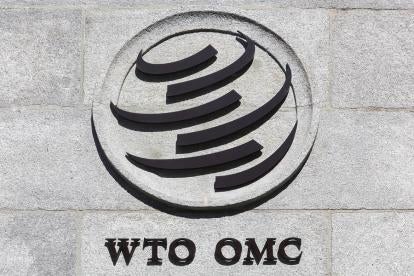On May 5, 2021, the Biden Administration announced its support for waiving intellectual property protections for COVID-19 vaccines. Understandably, the news made headlines and stirred passionate reactions from the medical community and IP holders alike. But actually bringing about that waiver will be a complicated process, and one that depends on many countries and parties besides the United States.
The text of the Administration’s announcement shows that waiving international IP protections will be easier said than done:
The Administration believes strongly in intellectual property protections, but in service of ending this pandemic, supports the waiver of those protections for COVID-19 vaccines. We will actively participate in text-based negotiations at the World Trade Organization (WTO) needed to make that happen. Those negotiations will take time given the consensus-based nature of the institution and the complexity of the issues involved.
In other words, it is the WTO as a whole that must effectuate an IP waiver. And given that WTO decisions are made by unanimous agreement of its 164-country membership without any formal vote, that process will require far more than support from the United States, as dissent from any one country on the terms of a waiver would block the initiative.
To be a member of the WTO, countries must agree to the Trade-Related Aspects of Intellectual Property Rights Agreement (known commonly as the TRIPS Agreement). That agreement contains a minimum set of standards by which each country must abide with respect to patents, trademarks, copyrights, trade secrets, and other forms of intellectual property. Thus, in order to waive IP protection for COVID-19 vaccines, the provisions of the TRIPS Agreement must be superseded. While the TRIPS Agreement provides that “Members may, in formulating or amending their laws and regulations, adopt measures necessary to protect public health and nutrition,” it adds that this may be done only if “such measures are consistent with the provisions of this Agreement.”
The endeavor to waive IP rights started before the United States’ announcement. In October 2020—before any vaccines had even been approved—India and South Africa made a proposal to the WTO’s TRIPS Council for the waiver of intellectual property rights related to the prevention, containment or treatment of COVID-19. Specifically, they sought waiver of protections for copyright (Part II, Section 1 of the TRIPS Agreement), industrial design (Part II, Section 4), patents (Part II, Section 5), and trade secrets (Part II, Section 7), as well as enforcement mechanisms under Part III. Per the terms of the proposal, member countries would not be obligated to implement, apply or enforce the foregoing protections with respect to COVID-19 prevention, containment or treatment. In other words, member countries could choose not to enforce IP rights against vaccine manufacturers who would otherwise be infringing on those rights. The scope of the proposal underscores the myriad IP rights that could conceivably be waived in order for COVID-19 vaccines to be made by additional manufacturers.
While more than 100 countries have voiced support for IP waivers generally, they have yet to express agreement on the scope and the duration of those waivers. Sixty-two countries—including India and South Africa—submitted a revised proposal on May 21, 2021 that would limit the duration of waivers to three years, after which the WTO’s General Council would “review the existence of the exceptional circumstances justifying the waiver.”
Numerous countries have voiced opposition to these proposals. Shortly after the United States’ announcement, Germany rejected the proposition of a waiver, stating: “The protection of intellectual property is a source of innovation and must remain so in the future.” The German company BioNTech partnered with Pfizer on development of its vaccine and expects $11.5 billion in vaccine revenue from supply contracts already signed. European Commission President Ursula von der Leyen has stated that the European Union is open to a discussion, but that waiver of IP “is not a topic for the short term or medium term.” And G20 countries signed onto a May 21 “Rome Declaration” affirming that member countries should take measures against COVID-19 while “working consistently within the TRIPS agreement.” Notably, the signatories included U.S. Vice President Kamala Harris.
Even if sufficient waivers were implemented, that would not guarantee speedy production and distribution of vaccines. Production requires many highly technical processes and detailed know-how, regardless of whether IP restrictions are in place, and Non-IP holding manufacturers may not be in a position to take advantage of a waiver. Moderna may be a case in point. It vowed in October 2020 that it would “not enforce our COVID-19 related patents against those making vaccines intended to combat the pandemic,” and that it would license IP for COVID-19 vaccines to others for the post-pandemic period. Yet, there has been no report from Moderna that any companies have taken advantage of that opportunity.
Given the above considerations, there will be two important aspects of IP waivers to watch over the coming weeks and months. The first is the negotiation among WTO member countries about the scope of IP waivers, and whether those negotiations can proceed fast enough to have an impact on vaccine availability. The second is whether, in addition to waivers, IP holders will actively support new manufacturers with respect to vaccine production, and whether that could or would be legislated by the WTO. These are uncharted waters with respect to international IP rights, not only for COVID-19 vaccines, but potentially for many other life-saving medicines.




 i
i


